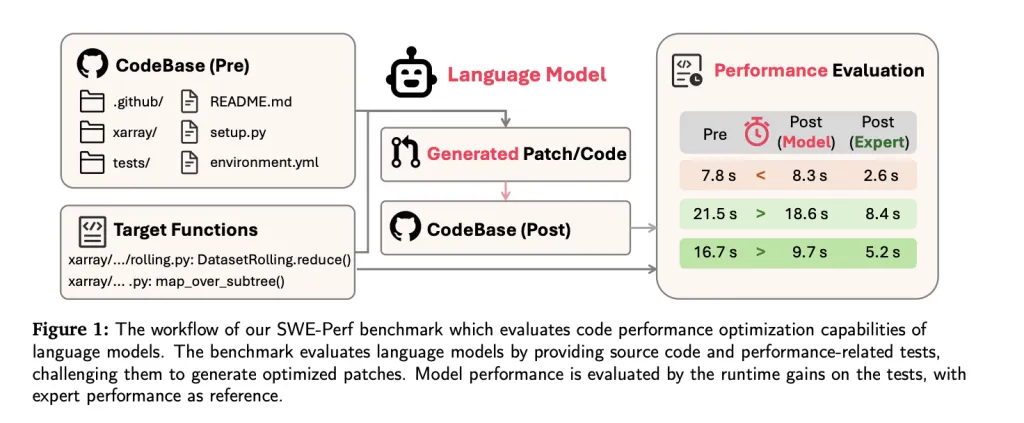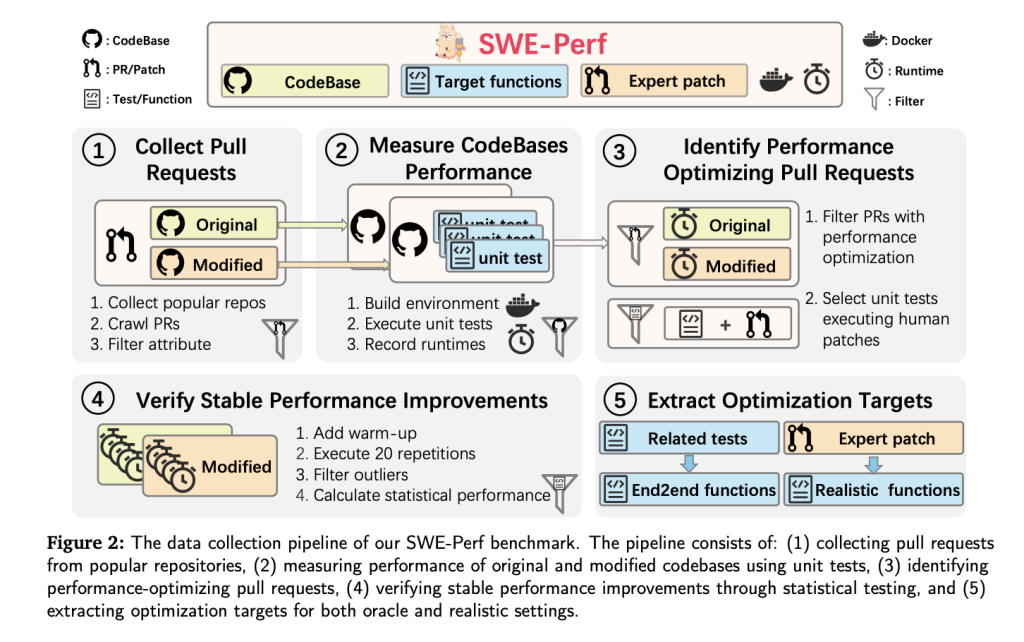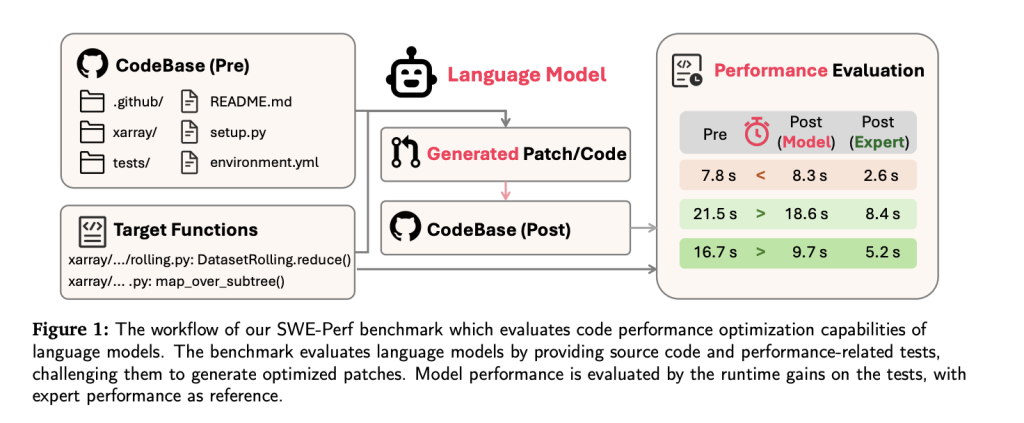Introduction
As large language models (LLMs) advance in software engineering tasks—ranging from code generation to bug fixing—performance optimization remains an elusive frontier, especially at the repository level. To bridge this gap, researchers from TikTok and collaborating institutions have introduced SWE-Perf—the first benchmark specifically designed to evaluate the ability of LLMs to optimize code performance in real-world repositories.
Unlike prior benchmarks focused on correctness or function-level efficiency (e.g., SWE-Bench, Mercury, EFFIBench), SWE-Perf captures the complexity and contextual depth of repository-scale performance tuning. It provides a reproducible, quantitative foundation to study and improve the performance optimization capabilities of modern LLMs.

Why SWE-Perf Is Needed
Real-world codebases are often large, modular, and intricately interdependent. Optimizing them for performance requires understanding of cross-file interactions, execution paths, and computational bottlenecks—challenges beyond the scope of isolated function-level datasets.
LLMs today are largely evaluated on tasks like syntax correction or small function transformations. But in production environments, performance tuning across repositories can yield more substantial system-wide benefits. SWE-Perf is explicitly built to measure LLM capabilities in such settings.

Dataset Construction
SWE-Perf is constructed from over 100,000 pull requests across high-profile GitHub repositories. The final dataset covered 9 repositories including:
- 140 curated instances demonstrating measurable and stable performance improvements.
- Complete codebases pre- and post-optimization.
- Target functions categorized as oracle (file-level) or realistic (repo-level).
- Unit tests and Docker environments for reproducible execution and performance measurement.
- Expert-authored patches used as gold standards.
To ensure validity, each unit test must:
- Pass before and after the patch.
- Show statistically significant runtime gains over 20 repetitions (Mann-Whitney U test, p < 0.1).
Performance is measured using minimum performance gain (δ), isolating statistical improvements attributable to the patch while filtering noise.
Benchmark Settings: Oracle vs. Realistic
- Oracle Setting: The model receives only the target functions and corresponding files. This setting tests localized optimization skills.
- Realistic Setting: The model is given an entire repository and must identify and optimize performance-critical paths autonomously. This is a closer analog to how human engineers work.
Evaluation Metrics
SWE-Perf defines a three-tier evaluation framework, reporting each metric independently:
- Apply: Can the model-generated patch be applied cleanly?
- Correctness: Does the patch preserve functional integrity (all unit tests pass)?
- Performance: Does the patch yield measurable runtime improvement?
The metrics are not aggregated into a single score, allowing more nuanced evaluation of tradeoffs between syntactic correctness and performance gains.
Experimental Results
The benchmark evaluates several top-tier LLMs under both oracle and realistic settings:
| Model | Setting | Performance (%) |
|---|---|---|
| Claude-4-opus | Oracle | 1.28 |
| GPT-4o | Oracle | 0.60 |
| Gemini-2.5-Pro | Oracle | 1.48 |
| Claude-3.7 (Agentless) | Realistic | 0.41 |
| Claude-3.7 (OpenHands) | Realistic | 2.26 |
| Expert (Human Patch) | – | 10.85 |
Notably, even the best-performing LLM configurations fall significantly short of human-level performance. The agent-based method OpenHands, built on Claude-3.7-sonnet, outperforms other configurations in the realistic setting but still lags behind expert-crafted optimizations.
Key Observations
- Agent-based frameworks like OpenHands are better suited for complex, multi-step optimization, outperforming direct model prompts and pipeline-based approaches like Agentless.
- Performance degrades as the number of target functions increases—LLMs struggle with broader optimization scopes.
- LLMs exhibit limited scalability in long-runtime scenarios, where expert systems continue to show performance gains.
- Patch analysis shows LLMs focus more on low-level code structures (e.g., imports, environment setup), while experts target high-level semantic abstractions for performance tuning.
Conclusion
SWE-Perf represents a pivotal step toward measuring and improving the performance optimization capabilities of LLMs in realistic software engineering workflows. It uncovers a significant capability gap between existing models and human experts, offering a strong foundation for future research in repository-scale performance tuning. As LLMs evolve, SWE-Perf can serve as a north star guiding them toward practical, production-ready software enhancement at scale.
Check out the Paper, GitHub Page and Project. All credit for this research goes to the researchers of this project.
Sponsorship Opportunity: Reach the most influential AI developers in US and Europe. 1M+ monthly readers, 500K+ community builders, infinite possibilities. [Explore Sponsorship]
The post TikTok Researchers Introduce SWE-Perf: The First Benchmark for Repository-Level Code Performance Optimization appeared first on MarkTechPost.
Source: Read MoreÂ



